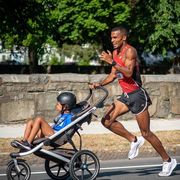Today's children are significantly less aerobically fit than kids of the past, and the problem isn't limited to the United States, according to research presented Tuesday at the American Heart Association's Scientific Sessions 2013 in Dallas.
Researchers analyzed 50 studies on running fitness between 1964 and 2010 that involved more than 25 million kids, ages 9 to 17, in 28 countries. They gauged cardiovascular endurance by how far kids could run in a set time or how long it took to run a set distance. Tests typically lasted five to 15 minutes or covered a half-mile to two miles.
Cardiovascular endurance declined significantly within the 46 years, the researchers found. Average changes were similar between boys and girls, younger and older kids, and across different regions, although they varied country to country.
More From Runner's World

Overall, today's children are about 15% less aerobically fit than children 30 years ago, the researchers said. That translates to being about 90 seconds slower when doing a timed mile.
The researchers said the decline in fitness could have long-lasting effects, for individuals and society.
“If a young person is generally unfit now, then they are more likely to develop conditions like heart disease later in life,” said Grant Tomkinson, Ph.D., lead author of the study and senior lecturer in the University of South Australia’s School of Health Sciences.
Poor aerobic fitness also has more immediate ramifications for children. Recent research has shown that fit children outperform their less-fit peers in some measurements of learning and that being an active pre-teen is linked with improved school performance, with the effects of the latter sometimes lasting for years.
With the widespread defunding of physical education in school, parents have had to take more responsibility for their kids' fitness. Our kids running channel has a variety of resources, including guidance on how to get kids running and how to keep them motivated.

Scott is a veteran running, fitness, and health journalist who has held senior editorial positions at Runner’s World and Running Times. Much of his writing translates sport science research and elite best practices into practical guidance for everyday athletes. He is the author or coauthor of several running books, including Running Is My Therapy, Advanced Marathoning, and Meb for Mortals. Scott has also written about running for Slate, The Atlantic, the Washington Post, and other members of the sedentary media. His lifetime running odometer is past 110,000 miles, but he’s as much in love as ever.












